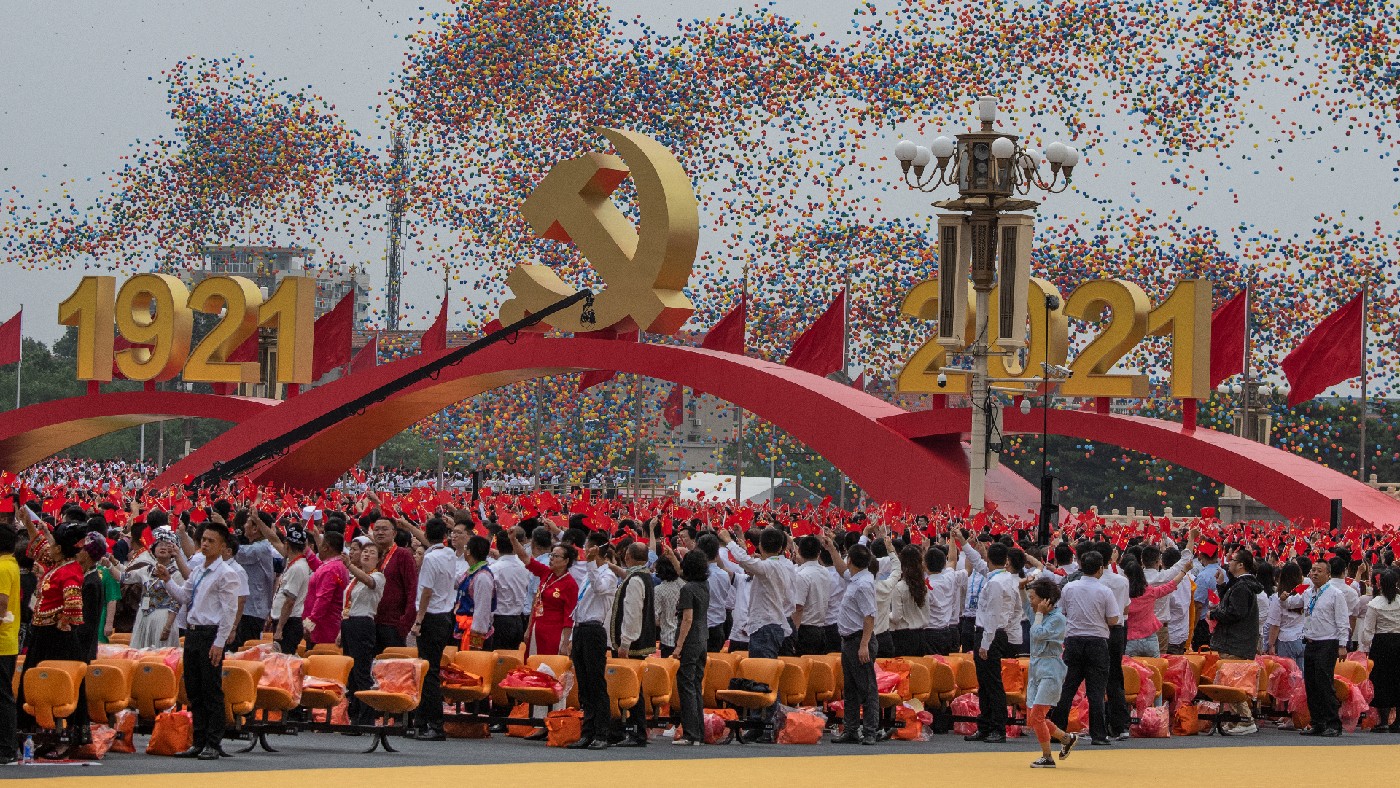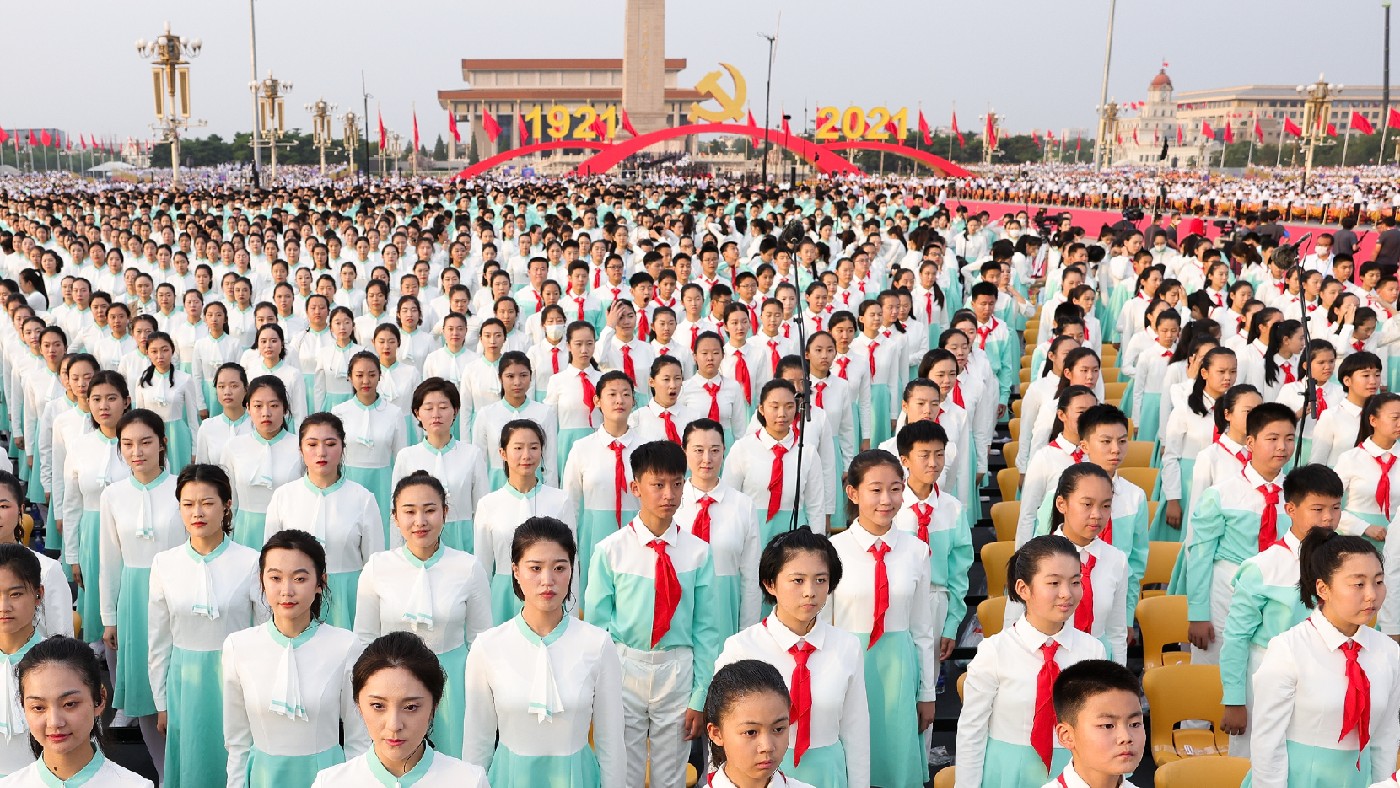The Chinese Communist Party turns 100: how the world’s most powerful political party began
The CCP’s rule is the third longest of any political party in history

A free daily email with the biggest news stories of the day – and the best features from TheWeek.com
You are now subscribed
Your newsletter sign-up was successful
Don’t try to “bully” China, or you’ll get a bloody nose. That was the Chinese president Xi Jinping’s warning to the world on the centenary of the founding of the Chinese Communist Party (CCP), said William Yang in The Independent. Xi told a flag-waving crowd that anyone who tries to “oppress” China will “have their heads bashed bloody against a Great Wall of steel”.
The celebrations included a “dazzling” re-enactment of the CCP’s “early struggles” and its “recent achievements”. They glossed over the grim era between 1950 and 1970, when Chairman Mao Zedong’s policies killed millions and pushed China into “extreme poverty”.
Yet Xi seems increasingly to be a leader in Mao’s mould: in office since 2012, he has abolished the two-term limit on the presidency and tightened ideological control, using technology to monitor citizens. A government unit pushes a party-approved version of history, with contrary views demonised as “historical nihilism”. State media fosters a Mao-style personality cult around “Xi Dada” or “big daddy”, said Ian Williams in The Spectator. His approach, though, owes more to “strident ethnic nationalism” than communism.
The Week
Escape your echo chamber. Get the facts behind the news, plus analysis from multiple perspectives.

Sign up for The Week's Free Newsletters
From our morning news briefing to a weekly Good News Newsletter, get the best of The Week delivered directly to your inbox.
From our morning news briefing to a weekly Good News Newsletter, get the best of The Week delivered directly to your inbox.
Under Xi, China adopts two rather different tones abroad, said Charles Moore in The Daily Telegraph. Claiming to pursue “dialogue” and harmony, it has infiltrated “hundreds of Western universities, businesses and other institutions”. The tone changes abruptly, though, if anyone raises questions about its theft of intellectual property; its treaty-breaking assault on the liberties of Hong Kong; or its “Belt and Road Initiative” – a “massive imperial project” giving it control of transport routes and natural resources around the world. Then, with angry threats and boycotts, the CCP’s true face is revealed: of a totalitarian regime bent on global domination.

The West has misread the CCP for 50 years, said Matthew Syed in The Sunday Times. Ever since Henry Kissinger and Richard Nixon first engaged with it, the “fantasy” was that if we traded with communist China and gave it a seat on the UN Security Council, it would “absorb our values”. It didn’t, as its rising militarism and “genocide” against the Muslim Uighur minority show.
China now feels strong enough to challenge the US economically, “and maybe even prevail”, said The Times. “But Party control will always be a brake.” A society without freedom of speech “cannot count on innovation”. A nation without internal criticism cannot correct mistakes or fight corruption. “China may be hailing the Party as the institution that has made it great.” But the CCP faces an uncertain future.
A free daily email with the biggest news stories of the day – and the best features from TheWeek.com
-
 ‘Restaurateurs have become millionaires’
‘Restaurateurs have become millionaires’Instant Opinion Opinion, comment and editorials of the day
-
 Earth is rapidly approaching a ‘hothouse’ trajectory of warming
Earth is rapidly approaching a ‘hothouse’ trajectory of warmingThe explainer It may become impossible to fix
-
 Health insurance: Premiums soar as ACA subsidies end
Health insurance: Premiums soar as ACA subsidies endFeature 1.4 million people have dropped coverage
-
 Corruption: The spy sheikh and the president
Corruption: The spy sheikh and the presidentFeature Trump is at the center of another scandal
-
 Putin’s shadow war
Putin’s shadow warFeature The Kremlin is waging a campaign of sabotage and subversion against Ukraine’s allies in the West
-
 The fall of the generals: China’s military purge
The fall of the generals: China’s military purgeIn the Spotlight Xi Jinping’s extraordinary removal of senior general proves that no-one is safe from anti-corruption drive that has investigated millions
-
 Epstein files topple law CEO, roil UK government
Epstein files topple law CEO, roil UK governmentSpeed Read Peter Mandelson, Britain’s former ambassador to the US, is caught up in the scandal
-
 Iran and US prepare to meet after skirmishes
Iran and US prepare to meet after skirmishesSpeed Read The incident comes amid heightened tensions in the Middle East
-
 Syria’s Kurds: abandoned by their US ally
Syria’s Kurds: abandoned by their US allyTalking Point Ahmed al-Sharaa’s lightning offensive against Syrian Kurdistan belies his promise to respect the country’s ethnic minorities
-
 Israel retrieves final hostage’s body from Gaza
Israel retrieves final hostage’s body from GazaSpeed Read The 24-year-old police officer was killed during the initial Hamas attack
-
 China’s Xi targets top general in growing purge
China’s Xi targets top general in growing purgeSpeed Read Zhang Youxia is being investigated over ‘grave violations’ of the law